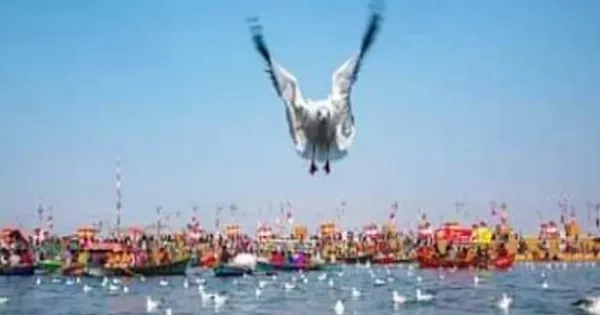There will be a confluence of amazing and endangered birds in the Maha Kumbh, the team of wild life is engaged in monitoring.
Bureau Prayagraj. 150 pairs of endangered Indian Skimmers have come here to witness the amazing Maha Kumbh. The chirping of these colorful guests on the sands of Sangam is playing a supernatural tune, meeting the yesterday and tomorrow of Mother Ganga. People from all over the country and abroad have started coming for this bird sound therapy. Currently, the world's fastest flying Peregrine Falcon is also being awaited. This bird, which is faster than the bullet train of Japan and China, talks through the air at a speed of 300 kilometers per hour. This supernatural scene in the Sangam area is giving a boost to the efforts to promote eco-tourism in the state.
The Forest Department is also going to celebrate this occasion by organizing Pur Bhai Festival before the Mahakumbh. Alok Kumar Pandey, IT Head of the Forest Department in Prayagraj, said that even before the Mahakumbh, a large number of migratory birds are coming to Prayagraj. Along with these, the endangered Indian Skimmer and Siberian Stork are also present in large numbers. To count the local and foreign birds arriving in such large numbers, a wildlife team has been deployed which is keeping a special watch on these birds day and night. Wildlife community officer KP Upadhyay said that Indian skimmers, which are endangered across the world, have come to the Sangam banks in pairs of more than 150. It is helpful to a great extent in preventing pollution. Not only this, it also works to increase the purity of water.
These birds, which reached the banks of Sangam in such large numbers even before the beginning of Mahakumbh, have become a center of attraction for people coming from India and abroad. Currently, Indian Skimmers can be easily seen strolling on the sand dunes in the morning and evening. Here on the banks of Mother Ganga, more than 90 species of birds like Schedule One Indian Skimmer, Siberian, Black Crane, Stork have come to welcome the Maha Kumbh. Just two years ago, Peregrine Falcon was also seen in Prayagraj which is expected to arrive during Mahakumbh.
It is the fastest flying bird in the world, whose speed is considered to be more than the bullet trains of Japan and China. It is capable of flying at a speed of more than 300 kilometers per hour. Apart from these, various types of local and foreign birds have come to enhance the beauty of Mahakumbh considering the Sangam as auspicious. These foreign guests from more than 10 countries including Siberia, Mongolia, Afghanistan have come to enjoy the Mahakumbh. Bird scientists said that Indian skimmers, which have reached Prayagraj in large numbers, are very sensitive. They make various arrangements to protect their eggs. The most important thing is that they mostly lay only three eggs. While the female guards the eggs by covering them with her wings, the male goes to fill his wings with water. When the male returns, he moisturizes the eggs with his wet feathers.
Then sends it to the female to moisten her wings. In India they are also called Panchira, because they move forward by cutting the water. One of their beaks is small and the other is big. Siberian birds make the island at the confluence of Ganga, Yamuna and Saraswati their home. The arrival of these birds signals the beginning of winter. These Siberian birds, who have arrived from more than 10 countries including Siberia, Mongolia and Afghanistan, will spend time here till Mahakumbh. The Peregrine Falcon, the fastest flying bird in the world, can also be seen on the Sangam banks during the Maha Kumbh. This is a species of eagle. Its flying speed is more than 300 kilometers per hour. It is also called rocket bird. It is generally found in North America. That is why it is considered to be a bird that flies faster than the bullet trains of Japan and America. According to ornithologists, it was seen on the banks of the confluence in the year 2022. It is believed that this will enhance the beauty of the Sangam till Mahakumbh.


Comments are closed.